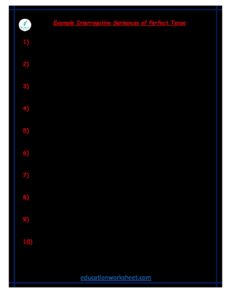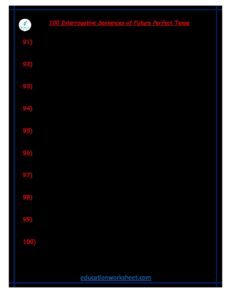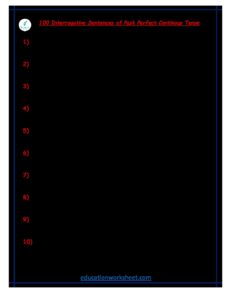Perfect Tense interrogative examples
Perfect Tense interrogative examples
Language is a dynamic and complex system that allows us to communicate, express ideas, and share information. One crucial aspect of language is tense, which indicates when an action took place in relation to the present. One of the more intricate tenses in English grammar is the perfect tense. In this extensive discussion, we will delve into the world of perfect tense, specifically focusing on interrogative sentences, which are questions that seek information or clarification.
Perfect Tense Overview

The perfect tense is a verb tense used to describe actions that are completed before the present or another point in time. It is formed by using the auxiliary verb “have” (in different forms) and the past participle of the main verb. The perfect tense can be categorized into three primary forms:
- Present Perfect: It is formed by using “have/has” and the past participle. It is used to describe actions that began in the past and continue into the present or are relevant to the present. For example, “I have eaten lunch.”
- Past Perfect: It is formed by using “had” and the past participle. It is used to indicate actions that were completed before a specific point in the past. For example, “She had finished her homework before dinner.”
- Future Perfect: It is formed by using “will have” or “shall have” (in future perfect) and the past participle. It describes actions that will be completed before a specific point in the future. For example, “By this time next year, I will have graduated.”
Perfect Tense Interrogative
Interrogative sentences, also known as questions, are a crucial aspect of language. They allow us to gather information, seek clarification, and engage in meaningful conversations. In English, interrogative sentences can be formed in various ways, including yes/no questions and wh-questions. When it comes to perfect tenses, constructing interrogative sentences requires careful consideration of word order and auxiliary verbs. Let’s explore these interrogative forms for each of the perfect tenses.
Present Perfect Interrogative
Present perfect interrogative sentences are used to inquire about actions that began in the past and are still relevant to the present. They often start with auxiliary verbs like “have” or “has.” Here are some examples:
- Have you finished your assignment?
- This question seeks information about whether the assignment has been completed, with the action’s relevance to the present.
- Has he ever traveled abroad?
- This question is asking about a person’s travel experience with a connection to the present or their lifetime.
- Have they met the new manager yet?
- This question seeks to determine whether a group of people has had an encounter with the new manager up to the present moment.
In these examples, the auxiliary verbs “have” and “has” initiate the questions, followed by the subject and the past participle form of the main verb, indicating the completion of actions.
Past Perfect Interrogative

Past perfect interrogative sentences are used to inquire about actions that were completed before a specific point in the past. The auxiliary verb “had” is integral in forming these questions. Here are some examples:
- Had you finished the book before the movie came out?
- This question is seeking to understand whether the book was completed before the movie’s release, emphasizing the sequence of events.
- Had she already left when you arrived?
- This question is asking whether someone’s departure preceded your arrival.
- Had they sold the house before the market crashed?
- This question inquires about the timing of a house sale in relation to a significant market event.
These examples illustrate the use of the auxiliary verb “had” to form questions that involve actions completed before a specific point in the past.
Future Perfect Interrogative

Future perfect interrogative sentences are used to inquire about actions that will be completed before a specific point in the future. They commonly begin with “will have” or “shall have” in addition to the past participle. Here are some examples:
- Will you have finished your project by the deadline?
- This question is focused on the completion of a project with respect to a future deadline.
- By the time we arrive, will they have prepared the presentation?
- This question seeks information about the preparation of a presentation in anticipation of your arrival.
- Shall he have retired by the time he turns 60?
- This question inquires about a person’s retirement plans and their relation to their age.
These examples illustrate how future perfect interrogative sentences use “will have” or “shall have” to convey the completion of actions before a future event.
Common Patterns and Rules for Perfect Tense Interrogatives
While perfect tense interrogatives can seem complex, they follow specific patterns and rules. Here are some important guidelines to remember when forming these interrogative sentences:
- Use the appropriate auxiliary verb:
- Present perfect: Use “have” for most subjects, except for the third person singular (he, she, it), which takes “has.”
- Past perfect: Use “had” for all subjects.
- Future perfect: Use “will have” or “shall have” for all subjects.
- Follow the auxiliary verb with the subject:
- The subject usually comes after the auxiliary verb.
- Use the past participle of the main verb:
- The past participle is used to indicate the completion of the action.
- Begin the question with an auxiliary verb:
- In English, interrogative sentences typically start with an auxiliary verb, which is different from declarative sentences.
- Use question words when necessary:
- Question words (e.g., who, what, when, where, why, how) can be added to interrogatives to seek specific information.
Examples:
- What have you been doing all morning?
- This question uses “have” as the auxiliary verb and the past participle “doing” to inquire about the person’s activities.
- When had she completed the course?
- This question employs “had” as the auxiliary verb and the past participle “completed” to ask about the timing of course completion.
- How will they have resolved the issue by the end of the week?
- In this question, “will have” is the auxiliary verb, and the past participle “resolved” is used to ask about the resolution of an issue and the timeframe.

